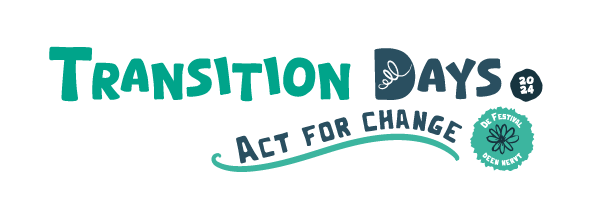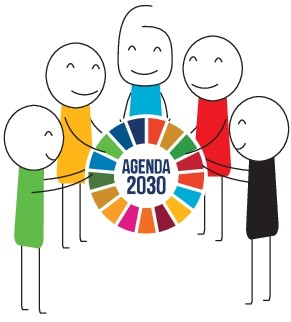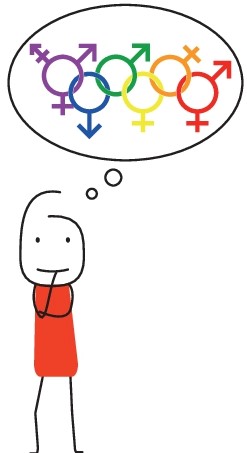Over the past months, the same questions have been running through Lou’s mind as she sits in her living room. What impact has the COVID-19 crisis had on society? How can the crisis be used to bring about sustainable change in Luxembourg both inside and outside the home? What role can Lou play in all of this herself? How can we all play a valuable role in bringing about social change? How can we become actors of change (AoCs)?
The culture of sustainability —the crisis before the crisis
The 2030 Agenda for Sustainable Development was adopted by the UN member states at the United Nations Sustainable Development Summit on 25 September 2015. The Agenda 2030 defines the international community’s approach to sustainable development until 2030. The 17 Sustainable Development Goals (SDGs) were also outlined at the summit with the aim of promoting sustainable social, economic and environmental development. The goals are intended to apply to all countries equally. The world’s efforts to implement Agenda 2030 are analysed each year in the Sustainable Development Goals Report.
The Sustainable Development Goals Report 2020 + UN (2020): The Sustainable Development Goals Report 2020+ makes for sobering reading, demonstrating that progress has, in fact, regressed. The world is not on course to achieve the global Sustainable Development Goals that promote dignity for all within planetary boundaries by 2030. Uneven progress was being made even before the coronavirus pandemic hit, with more attention being required in most areas. The pandemic abruptly stalled the implementation of many SDGs and in many cases decades of progress have been wiped away.
On 18 September 2020, UN General Secretary António Guterres convened the first Sustainable Development Goals Moment (SDG Moment) of the Decade of Action. The SDG Moment supports governments and partners as they grapple with the COVID-19 crisis and throughout the subsequent period of recovery, while ensuring that the 2030 Agenda for Sustainable Development serves as the guiding principle behind future action. The initiative is accompanied by a renewed sense of urgency, accountability, ambition and transformative possibilities surrounding implementation efforts even during the pandemic. It was also made clear that progress can only be achieved through joint action. Phumzile Mlambo-Ngcuka (Executive Director of UN Women), Achim Steiner (UNDP+United Nations Development Programme+ Administrator) and Inger Andersen (Executive Director of the UNEP+United Nations Environment Programme+) have joined together to demonstrate measures member states and interest groups can take to maximise progress toward achieving the SDGs by 2030, and protecting human life and the environment.
Jens Martens from the Global Policy Forum has also stressed the importance of taking practical action in his article “Eine gescheiterte Agenda?” [A failed agenda?]+Martens (2020): “Eine gescheiterte Agenda?” [A failed agenda?]+. He points out that numerous change processes have already been set in motion through Agenda 2030 and that the sustainability goals can serve as a framework for these kinds of processes. However, he emphasises that these processes must also be approached in an unequivocal and decisive way, especially now in the wake of the coronavirus crisis.
Agenda 2030 has increased awareness and changed the way sustainable development is viewed in many ways, a development that has been intensified by the pandemic. It has now become clear that our short-termist economic model that focuses on profit maximisation is unsustainable. The climate catastrophe is already here. The rise in conflicts between the rich and the poor and social polarisation are being felt in every home+Göpel (2020): Unsere Welt neu denken: Eine Einladung [Rethinking our world: an invitation]+, along with an awareness that we need to think differently and instigate fundamental change and transformation — for it is obvious that continuing in the same vein is no longer an option.
The pandemic has forced Lou to dwell inside the virtual space. She is now working from home, using a computer hooked to the internet. This allows her to access information at any time of the day or night — but only if her Wi-Fi connection is working without a hitch. Lou is one of 4.1 billion people around the world who are now online. Yet 52% of all women and at least 42% of all men around the world are excluded from accessing the internet+UN Women (2020): Progress On The Sustainable Development Goals. The Gender Snapshot+. Digitalisation enables Lou to work, maintain social relationships, interact with others and meet up with people to some degree. While social media platforms continually reinforce prevailing opinions, Teams, Webex, Zoom etc. allow her to decide who she wants to engage with, and this works in reverse too. Leave No One Behind? This new desire for virtual togetherness also raises questions concerning hardware production and energy consumption, namely: who is thinking about the impact and who is taking action? Why are people not up in arms about it?
The culture of courage — thinking the impossible
Mainstream society is not just focusing on relevant themes, but is calling for change and offering up ideas that will bring about genuine transformation.
For example, the Vermächtnisstudie [Legacy Study]+Allmendinger et al. (2020): “Vermächtnisstudie. So soll es werden” [Legacy Study. This is how it should be]+, which was conducted in Germany in 2015, 2018 and again in 2020 to determine what kind of legacy people want to leave for future generations, has shown: “Nearly 60% of the people surveyed have taken something positive away from the crisis. And nearly 70% believe that it is important to recognise the positive effects and that they should be carried forward into the future”. This desire for change has been greatly intensified due to the COVID-19 crisis.
In his book Utopia for Realists+Bregman (2019): Utopia for Realists+, Rutger Bregman explores ideas that he believes will create a better world, concluding that the time is ripe for a 15-hour week, a universal basic wage and open borders. He points to the fact that historical progress to date has almost always been based on utopian ideas. For example, only 100 years ago, no one would have believed that the abolition of slavery and the existence of democracies would ever have been possible.
But how can these utopian visions be realised? How do we turn these ideas into a reality? How can we constructively turn the changes caused by the pandemic, which we as individuals cannot control, into sustainable transformation? While remaining ensconced in her living room, Lou is reminded of the knock-on effects of the pandemic through the many disturbing news reports that come in from all over the world. For example, she hears of how school closures are leading to a rise in child labour in Paraguay and how South Africa’s ailing economy is threatening the existence of millions of people. Yet she refuses to simply wait for a return to normality. Lou does not want to wait at all — she wants to try something different.
So, what is it going to take to bring about change in specific terms? During a workshop that took place in September 2019 on the subject of social change+The workshop entitled “
Ready for a better world?” Actors of Change – Future Lab” was held on 27 September 2019 in Luxembourg as part of a week-long programme on sustainable development education. The event was run by several organisations in order to further understanding of social change and to discuss current conditions, future opportunities and ways in which individual AoCs and institutional agents can work together to shape social change.+, the participants were in complete agreement about one thing: Social change can be brought about from the top down as well as the bottom up.
Institutions and individual AoCs constantly influence each other. For example, individual AoCs are dependent on freedoms made available due to political action to realise their full potential, however, these freedoms can only be made available through political action if enough AoCs demand that this happens.
The pandemic has proven that dramatic changes are actually possible without physical destruction caused by war or natural disasters. It is not just consumer behaviour and the way we work and travel that have changed; our attitudes to communication technology and social interaction have also — perhaps or hopefully — fundamentally changed forever. Did this happen due to a level of insight and acceptance, or did change only happen as a result of fear? How can we prevent fear and insecurity from paralysing us and how can we learn to deal with these feelings to ensure we can play a constructive part in bringing about positive change?
As Rutger Bregman observes: “The real crisis of our times, of my generation, is not that we don’t have it good, or even that we might be worse off later on. No, the real crisis is that we can’t come up with anything better.”+Bregman (2019): Utopia for Realists.+ We therefore need to dare to think the impossible because this is the only way to solve the problems of our times.
To initiate change, AoCs need to have opportunities to experiment and to “stumble forward” because these processes do not always run smoothly. This is precisely why the worlds of politics, business and science need to lend their support and trust in the process when it comes to getting initiatives such as pilot projects off the ground.
In his article “Was wir der Angst verdanken” [What we owe to fear]+Hüther (2020): “Was wir der Angst verdanken” [What we owe to fear]+ , Gerald Hüther urges us to view fear as an opportunity. The fear of change and of new or uncomfortable things is a fundamental part of being human, as is our continuous attempt to rid ourselves of these things. As humans, we usually try to achieve this by changing our environment — and in doing so we continually create confusion in other areas which in turn instils fear. Moreover, our continuous attempts to make a situation that has become confusing a little less confusing inevitably causes mistakes to happen. If change occurs too quickly or abruptly — which is exactly what happened when the pandemic hit at the start of 2020 — we can no longer shape our environment so that we are no longer fearful of new things.
The pandemic has proven that dramatic changes are actually possible without physical destruction caused by war or natural disasters. It is not just consumer behaviour and the way we work and travel that have changed; our attitudes to communication technology and social interaction have also — perhaps or hopefully — fundamentally changed forever. Did this happen due to a level of insight and acceptance, or did change only happen as a result of fear? How can we prevent fear and insecurity from paralysing us and how can we learn to deal with these feelings to ensure we can play a constructive part in bringing about positive change?
As Rutger Bregman observes: “The real crisis of our times, of my generation, is not that we don’t have it good, or even that we might be worse off later on. No, the real crisis is that we can’t come up with anything better.”+Bregman (2019): Utopia for Realists.+ We therefore need to dare to think the impossible because this is the only way to solve the problems of our times.
To initiate change, AoCs need to have opportunities to experiment and to “stumble forward” because these processes do not always run smoothly. This is precisely why the worlds of politics, business and science need to lend their support and trust in the process when it comes to getting initiatives such as pilot projects off the ground.
In his article “Was wir der Angst verdanken” [What we owe to fear]+Hüther (2020): “Was wir der Angst verdanken” [What we owe to fear]+ , Gerald Hüther urges us to view fear as an opportunity. The fear of change and of new or uncomfortable things is a fundamental part of being human, as is our continuous attempt to rid ourselves of these things. As humans, we usually try to achieve this by changing our environment — and in doing so we continually create confusion in other areas which in turn instils fear. Moreover, our continuous attempts to make a situation that has become confusing a little less confusing inevitably causes mistakes to happen. If change occurs too quickly or abruptly — which is exactly what happened when the pandemic hit at the start of 2020 — we can no longer shape our environment so that we are no longer fearful of new things.
The culture of individualistic change — every one of us is an actor of change
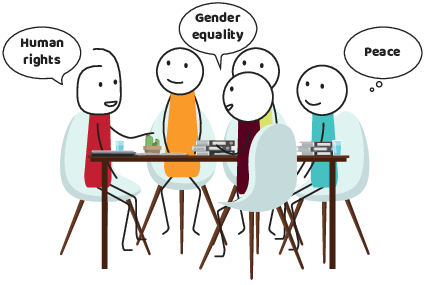
Gerald Hüther believes that individualistic change remains the only solution because even though people are capable of changing quite fundamentally, they only ever change if they really want to. The will to change only happens if people recognise that their previous behavioural patterns and attitudes no longer serve them well. Only when these patterns have been fundamentally shaken, destabilised and brought into a state of confusion, and only when people recognise that new patterns of behaviour and attitudes can make life better and happier, is there a chance that things will change.
Jifke Sol has described a similar phenomenon+ Sol et al. (2017): “Reframing the future: The role of reflexivity in governance networks in sustainability transitions”+, noting that people have the potential to change themselves: if they continually evaluate and re-evaluate themselves, their actions, attitudes and relationships with others; if they understand how their emotions and values influence their actions; and if they are able to regulate these emotions and values if necessary. In doing so, they can become an AoC and a role model for others through living by their values and setting an example in a coherent and authentic way. Every AoC takes on an important role in sustainable transformation processes. They initiate processes and continually influence their development, especially if there is a risk that the change may not happen.
One way to engage, strengthen and empower individual AoCs is sustainable development education. It is necessary to draw a distinction between two complementary tendencies+Rieckmann (2020): “Bildung für nachhaltige Entwicklung im Kontext der Sustainable Development Goals” [Sustainable development education in the context of the Sustainable Development Goals]+. The first tendency is behavioural in nature and focuses on solutions and expertise. The second tendency starts from a more reflexive approach. This is less about patterns of thinking and behaviour and more about enabling individuals to think about questions concerning sustainable development themselves, and to find their own answers and strategies. In this context, sustainable development is not seen as a closed form of discourse conducted by experts but as an open social (learning) process. The guiding principle here is the realisation that it is often not clear at all which patterns of behaviours are actually more sustainable than others. This allows sustainable development and its accompanying complexities, uncertainties and contradictions to be examined critically. Capacity building and critical thinking have become the focus as prerequisites for making individualistic decisions in relation to sustainable development. Findings from change research show that as individuals AoCs can have more impact when they follow this approach.
Lou is ready for a better world. She has understood that she has to overcome or use fear and insecurity to become an AoC. But how can she play a part and become a piece in the puzzle of the collective “we”? How can we bring about change together?
The culture of communication — learning from each other
Discussions during the workshop in September 2019 concluded that AoCs must be able to build networks in a specific area, create synergies and learn from each other. In social learning, knowledge that is bound to specific areas and locations is pooled together in local projects. Here it is important that AoCs trust each other, withstand tensions and overcome obstacles as they work together in groups.
The living room used to be a place where everything happened. It was a space where people would come together. It was the market square of the home — a place to talk, play, eat, drink … and to live. Members of the household would meet here and would often be joined by other people. Here, ideas would be tossed back and forth, developed and sometimes become completely entangled. Now in the midst of the current crisis, the living room has been turned into a virtual space. What has changed? Have we become more attentive and considerate in the way we interact with other people? How do we carry forward this new level of mindfulness as we emerge into the new normal?
The culture of social change — no way back to normality
So, what remains from our living rooms? Is it still possible to hope for a deeper understanding, for opportunities to apply what’s been learned and for a chance to engage in social learning and networked thinking? When did specific changes happen and how quickly did the new normal emerge? Which changes should we hold onto and how do we achieve this? In which contexts can we bring about change and how do we go about it? Will we use the crisis as an opportunity to actively bring about change across the whole of society?
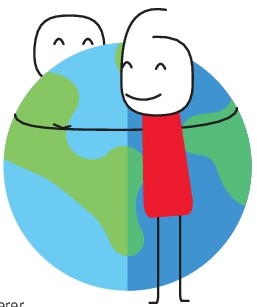
To ensure there is real systemic change throughout the whole of society, we need people to be prepared to challenge the status quo more frequently in a well-intentioned manner and to show more courage, humanity, mutual respect and solidarity. Economic and knowledge monopolies must be stopped and a critical mass needs to monitor the actions of institutions and corporations to ensure they are credible. Individual AoCs form the foundation of critical majorities, which live coherently by their own values, and in doing so set an example for the whole of society. AoCs need support, trust and empowerment!
Blueprints have been created when similar virulent pandemics occurred (Spillover+Quammen (2013): Spillover.+ and Pale Rider+Spinney, Pale Rider (2018): The Spanish Flu of 1918 and How it Changed the World.+ are examples of pandemic prevention measures and plans that have not been applied). And there is now a blueprint for sustainable development — the 17 Sustainable Development Goals set out in the Agenda 2030, which now, more than ever, need to be implemented by all of us together.
We must take the many small steps that are needed together in order to achieve wide-reaching transformation. And you can be a part of social change. Nearly 60% of people surveyed in Germany have taken something positive away from the crisis. What do you want to take away from it?
Be the light of change — well sou LIICHTMËSS Du en Ënnerscheed!
Article by the action group ‘Zesumme fir d’Agenda 2030’
Sources:
- Allmendinger, Jutta; Weber, Patrick; Wetzel, Jan (28.10.2020): “Vermächtnisstudie. So soll es werden” [Legacy Study. This is how it should be], in: Die Zeit, ed. 45/2020 (https://www.zeit.de/2020/45/vermaechtnisstudie-corona-klimakrise-digitaler-wandel/komplettansicht).
- Bregman (2019): Utopien Für Realisten. [Utopia for Realists]
- Göpel, Maja (2020): Unsere Welt neu denken: Eine Einladung. [Rethinking our world: an invitation]
- Hüther, Gerald (13.07.2020): “Was wir der Angst verdanken” [What we owe to fear], In: faktor – Magazin. (https://www.faktor-magazin.de/was-wir-der-angst-verdanken/?fbclid=IwAR0iInK1jXsoiQq1N6GqUkKXaPwbHfGYEJ8nBEEpnaxHCcXK9_0gUQObqh4).
- Martens, Jens (2020): “Eine gescheiterte Agenda?” [A failed agenda?] In: Südlink 193, ed. September 2020, p. 9-10 (https://www.2030agenda.de/sites/default/files/Suedlink_193_Jens%20Martens.pdf).
- Quammen, David (2013): Spillover: the powerful, prescient book that predicted the Covid-19 coronavirus pandemic.
- Rieckmann, Marco (2020): “Bildung für nachhaltige Entwicklung im Kontext der Sustainable Development Goals” [Sustainable development education in the context of the Sustainable Development Goals]. In: Kminek, H., Bank, F., Fuchs, L. (eds.): Kontroverses Miteinander. Interdisziplinäre und kontroverse Positionen zur Bildung für eine nachhaltige Entwicklung. [Controversial coexistence. Interdisciplinary and controversial positions on sustainable development education]. Frankfurt am Main: Goethe-Universität Frankfurt (Frankfurter Beiträge zur Erziehungswissenschaft), pp. 57-85.
- Sol, Jifke; Van der Wal, Merel M; Beers, Pieter Jelle; Wals, Arjen E.J. (2017): “Reframing the future: the role of reflexivity in governance networks in sustainability transitions”. In: Environmental Education Research, November 2017, pp.1–23 (https://www.researchgate.net/publication/321427547_Reframing_the_future_the_role_of_reflexivity_in_governance_networks_in_sustainability_transitions).
- Spinney, Laura (2018): Pale Rider: The Spanish Flu of 1918 and How it Changed the World.
- United Nations (2020): The Sustainable Development Goals Report 2020 (https://unstats.un.org/sdgs/report/2020/).
UN Women (2020): Progress On The Sustainable Development Goals. The Gender Snapshot 2020 (https://www.unwomen.org/-/media/headquarters/attachments/sections/library/publications/2020/progress-on-the-sustainable-development-goals-the-gender -snapshot-2020-en.pdf?la=en&vs=127).
